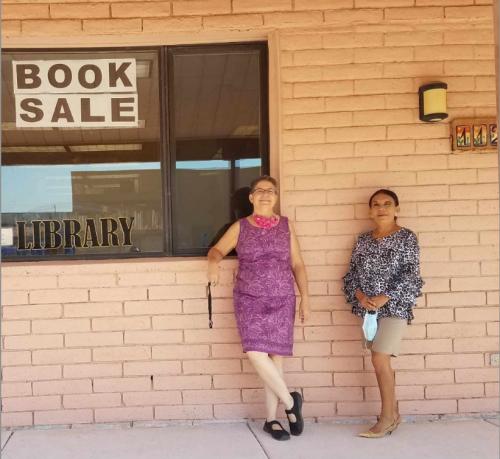https://newscenter.nmsu.edu/Articles/view/14456/verizon-nmsu-work-together-helping-columbus-students-access-internet?fbclid=IwAR3HWG3wMhZDCVUdMIqP8WjgNbo8qdrQBhKGus8sjJgLZ8RBhK8fLg2P-4w

From left: Maria Constantine, director, and Maggie Calderon, youth librarian, of the Columbus Village Library. Thanks to a $50,000 grant, New Mexico State University's computer science department is working with the Columbus Village Library to provide needed access to computers and internet access to students in Columbus, New Mexico. (Courtesy photo)
As online education becomes the new normal, many low-income families are struggling to find resources to allow their children to fully participate in classes. Nearly one-quarter of New Mexico’s students lack equipment and internet access at home.
As part of the National Association for Community College Entrepreneurship COVID-19 Funding and Support program in collaboration with New Mexico State University's computer science department, a one-year, $50,000 grant will provide both access to computers and critical online access to students in Columbus, New Mexico.
“Less than half of our homes have internet access, primarily because it's unaffordable for our lower-income citizens,” said Maria Constantine, the director of the Columbus Village Library. “This puts families at a disadvantage for educational and employment opportunities. This program will help level the playing field for kids and families to access the resources they need to improve their lives.”
With the grant funding, in collaboration with Constantine at the Columbus Village Library, 30 laptop computers will be purchased to loan out to students through a check out process along with Wi-Fi range extenders outside of the library, which allow students to access the internet from the parking lot.
“During our initial process, we learned that at least 50 people were accessing the internet from their vehicles,” said Adan Delval, director of the Verizon Innovation Learning Program. “During this pandemic, we need to make sure more kids have access to technology. We don’t want student’s education to be hindered because they don’t have access to technology. We want them to continue receiving a high-quality education.”
In 2017, the computer science department received a two-year grant to implement the Verizon Innovative Learning Program through the Verizon Foundation. The department then hosted a camp for 100 diverse middle school students to connect with technology.
“As a result of receiving the Verizon grant, we began collaborating with the National Association for Community College Entrepreneurship, which oversees this grant,” Delval said. “Earlier this summer we were informed by NACCE and the Verizon Foundation about the opportunity for a new, one-time $50,000 grant to aid our community with COVID-19 relief efforts,” said Delval. “We were provided with plenty of opportunities to explore how we wanted to serve our communities.”
Delval considered the needs in his hometown of Columbus, a New Mexico village of less than 1,500 people.
“I wish opportunities like these were provided to me when I was younger. I had a passion for computers, but opportunities like these were not available. Securing the funding for this project felt great as I feel it can provide students in Columbus with unique opportunities that will expose them to career fields they have probably never considered.”
Additionally, through the grant, parents will be provided with many other opportunities, including: access to workshops on computer literacy skills, including how to Microsoft Word and Excel to build resumes and maintain a budget and the chance to receive a $25 gift cards to purchase groceries. Students can join “TechXploration,” an online camp to expose them to computer science, coding and technology. “We hope in a few years they decide to come to NMSU to pursue a degree in computing fields” said Delval.
Three NMSU students will be working with Delval to develop the curriculum for the workshops and setting up the necessary technology in Columbus.
“In providing students with this access, we hope to also educate and expose these students to the field of computer science,” he said. “We hope that through fun and engaging activities we spark an interest in computing fields where they could potentially earn higher salaries. The demand for employees in computing fields is greater than the number of students graduating.”